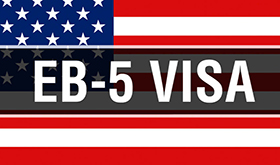The EB-5 Investor Visa Program
Immigrant petitions of foreign investors, also known as the EB5 immigrant visas, have successfully helped many immigrants and their families move to America permanently while contributing to creation of new jobs and assisting the industrial development in their new communities. EB5 investor visa became extremely popular due to the benefits (green card) it offers.

Applicants for the EB5 visas require no sponsor, have no language or minimum education requirement, and lack the long waiting periods that plague other visa programs. However, the largest benefits come after an EB5 visa investment has been approved. Investors and their families can live and work in America for two years as temporary residents, and then petition the U.S. government for the Legal Permanent Resident (LPR) status towards the end of the temporary period. Finally, after five years combined in temporary and LPR status, they like other LPR’s may become eligible to become U.S. citizens.
Invest privately in a new commercial enterprise
In general, “eligible EB5 visa individuals” include those who establish a new commercial enterprise, which can include creating an original business; purchasing an existing business and simultaneously or subsequently restructuring or reorganizing the business such that a new commercial enterprise results; or expanding an existing business by one hundred and forty percent (140%) of the pre-investment number of jobs or net worth, or retaining all existing jobs in a troubled business that has lost twenty percent (20%) of its net worth over the past one (1) to two (2) years.
There are two general ways for an investor to qualify for an EB5 visa. First, an investor can invest privately in either a new commercial enterprise in the United States, or a “troubled business.” Second, an investor can use a pilot program and invest through regional center. When investing in a new commercial enterprise, an investor must meet the following requirements:
An investment of at least $1 million into the business venture in the United States. However, if the investment is made into a Targeted Employment Area (TEA), the requirement is lowered to $500,000. A “targeted employment area” is a locale that has experienced unemployment of at least one hundred and fifty percent (150%) of the national average rate or a rural area. 3,000 of the 10,000 allocated EB-5 visas are designated annually for investments in TEAs.
The investment will create full-time employment opportunities for at least ten (10) workers, or maintain the number of existing employees at no less than the pre-investment level for a period of at least two years, where the capital investment is being made in a “troubled business. These jobs do not include the investor or any of his or her immediate family, but does include green card holders and other non-residents lawfully authorized to work in the United States.
One distinct advantage that this method offers investors is that any profits made during the course of the two-year visa period can be attributed to the investment. Only one-third (1/3) of the total $1 million investment must be paid up front, and the remaining two-thirds (2/3) can be accumulated while the business is operating. Any excess profit made after the total investment is completed then goes directly to the investors.
Invest privately in a “troubled business”
To qualify for an EB5 visa, an investor may also choose to invest into an existing business that suffered financial difficulties. U.S. law refers to such business as “troubled”. A “troubled business” is defined as a business entity that has been in existence for at least two (2) years and that has lost twenty percent (20%) of its net worth over the past one (1) to two (2) years. To qualify, an investor must fulfill the same requirements for a new commercial investment, except that at least ten jobs have to be preserved rather than created. The idea behind this modification is to help existing entities in staying in business by attracting qualifying investors. Many objective factors, not necessarily negligence or bad business model or practices, can contribute to economic decline of a business. Recognizing this fact US Immigration Law offers incentive to investors to invest not only in new business entities but also supporting existing thus contributing to the well being of the community they choose to invest in.
More Investment Visas
None of the investor categories have language, education or business experience requirements.

